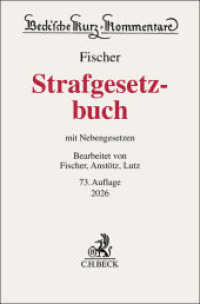- ホーム
- > 洋書
- > 英文書
- > Religion / Ethics
Full Description
Christian ethics has addressed moral agency and culture from the start, and Christian social ethics increasingly acknowledges the power of social structures. However, neither has made sufficient use of the discipline that specializes in understanding structures and culture: sociology. In Moral Agency within Social Structures and Culture, editor and contributor Daniel K. Finn proposes a field-changing critical realist sociology that puts Christian ethics into conversation with modern discourses on human agency and social transformation.
Catholic social teaching mischaracterizes social evil as being little more than the sum of individual choices, remedied through individual conversion. Liberation theology points to the power of social structures but without specifying how structures affect moral agency. Critical realist sociology provides a solution to both shortcomings. This collection shows how sociological insights can deepen and extend Catholic social thought by enabling ethicists to analyze more precisely how structures and culture impact human decisions. The book demonstrates how this sociological framework has applications for the study of the ecological crisis, economic life, and virtue ethics.
Moral Agency within Social Structures and Culture is a valuable tool for Christian ethicists who seek systemic change in accord with the Gospel.
Contents
Participants
Introduction
Part One: Overviews
Who Gets to Decide what Freedom Is?
A Christian Perspective C. Rosalee Velloso Ewell
God-Given Freedom: An Islamic Point of View Tuba Işik
Freedom in the Contemporary Context: Trends in Intersections of Religion, Development, and Foreign Policy Azza Karam
Part Two: Islamic Texts on Freedom
Aspects of Human Freedom: Reflections on Selections from the Quran and Hadith Abdullah Saeed
The Quran and Hadith on Freedom: Selections for Dialogue
Freedom as a Theme in Islamic Thought: An Introduction to Selected Pre-Modern Texts Lejla Demiri
Pre-Modern Islamic Writings on Freedom: Selected for Dialogue
Modern Muslim Elucidations and Contentions on Freedom: An Introduction to Texts for Dialogue Martin Nguyen
Islamic Thought from the Modern Period: Texts for Dialogue About Freedom
Part Three: Christian Texts on Freedom
Freedom in the Hebrew Bible: From Exodus to Ezekiel, by way of Reba McEntire and Rage against the Machine Christopher M. Hays
Old Testament Texts About Freedom: Selections for Dialogue
The Motif of Freedom in New Testament Texts: An Introduction Susan Eastman
New Testament Texts About Freedom: Selections for Dialogue
Thematic Dimensions of Freedom: Christian Texts from the Classical Period Jonathan Chaplin
Christian Thought on Freedom in the Classical Period: Selected Texts for Dialogue
Freedom in Modern Christian Thought: Introduction to Selected Texts Peniel Jesudason Rufus Rajkumar
Christian Writings from the Modern Period: Selections for Dialogue About Freedom
Part Four: Reflections
Conversations on the Theme of Freedom: Reflections on the Building Bridges Seminar at le Château de Bossey Lucinda Mosher
Subject Index
Scriptural Citation Index
About the Editor







